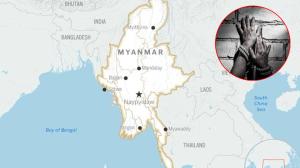
Virginia, USA: Meghna Sharma, an Indian-American entrepreneur, emerged as the winner of the 2024 Loudoun Innovation Challenge in the Life Sciences Technology category for her health-tech startup, VascRisk. The prestigious award was presented at a gala event held on December 5 at the Belmont Country Club in Ashburn, Virginia.
VascRisk, founded by Sharma, is based in Loudoun County and is pioneering advancements in cardiovascular health management with AI-powered solutions and personalized care. The company’s flagship product, ARTSENS, offers a non-invasive and cost-effective approach to assessing vascular health, addressing a critical need for early detection of cardiovascular diseases.
Sharma, who holds a Master’s in Computer and Information Technology (MCIT) from the University of Pennsylvania and has attended GW Medical School, is committed to transforming healthcare technology. VascRisk’s AI-driven platform not only offers personalized health plans but also provides real-time monitoring, aiming to revolutionize cardiovascular care and reduce the global impact of heart disease.
Alongside Sharma, Tseten Gurung, of Nepalese origin, and their teammates Kavya and Yashwini Krishnan, of Indian descent, were honored with a cash prize of $15,000 and a crystal trophy for their innovative work. Gurung, an undergraduate student majoring in Information Technology Management with a minor in Cybersecurity at the University of Minnesota Crookston, has also been recognized with the 2023 Mestenhauser Student Award and serves as Vice President of the Multicultural International Club.
Sharma expressed her gratitude for the recognition, noting that it would help extend the reach of their technology, empowering individuals to take control of their heart health. She emphasized how ARTSENS, through advanced ultrasound technology, can assess critical cardiovascular indicators like arterial stiffness, vascular age, and pulse wave velocity in just five minutes.
With a focus on women’s health and accessibility, VascRisk’s Screening-as-a-Service model extends cardiovascular monitoring to wellness centers, gyms, and clinics, making proactive heart health care more accessible to the public.












